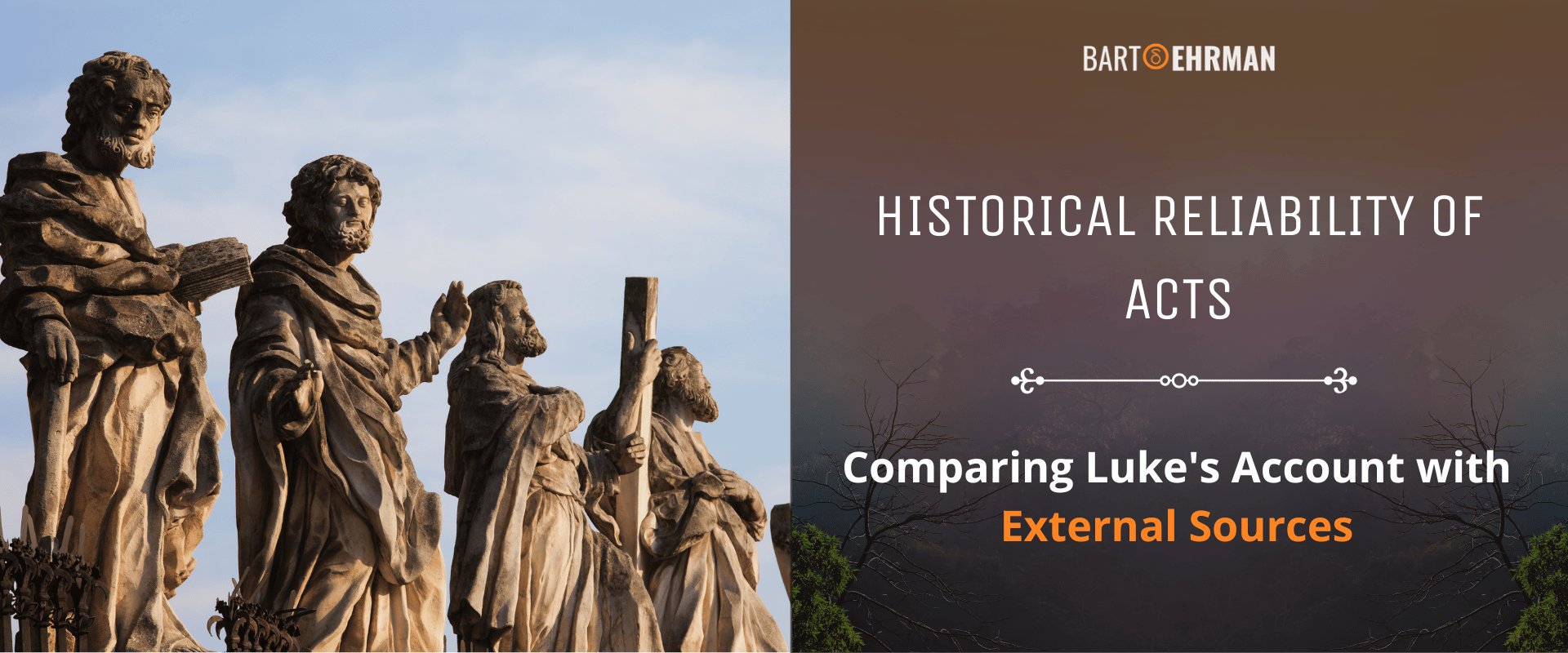Historical Reliability of Acts: Comparing Luke's Account with External Sources

Written by Joshua Schachterle, Ph.D
Author | Professor | Scholar
Author | Professor | BE Contributor
Verified! See our editorial guidelines
Verified! See our guidelines
Date written: September 20th, 2023
Disclaimer: The views and opinions expressed in this article belong to the author and do not necessarily match my own. - Dr. Bart D. Ehrman
Scholars have long debated the historical reliability of Acts. The text (full title “The Acts of the Apostles”) claims to be a history of the earliest Church. But is it? Or is it merely a mythological story written to shore up Christian claims? You’ll see in this article that while some of the events in Acts agree with other ancient writers like Josephus, its portrayal of Paul is a bit more problematic.

Uncovering Authorship - Who Wrote the Book of Acts?
One of our first steps in assessing Acts’ historical reliability is determining who wrote the book of Acts. Was the author an eyewitness to the events he describes? If so, then we might regard the events described in Acts as more historically accurate than events in second or third-hand sources.
Like many New Testament books, Acts was written anonymously and originally had no title. The title “Acts of the Apostles” isn’t used until decades after the book was written. Unfortunately, this means that we don’t know the individual who wrote it.
Traditionally, Luke-Acts was ascribed to Luke, a companion of Paul mentioned in one of Paul’s undisputed letters (Philemon 1:24). He is also mentioned in Colossians 4:14 and 2 Timothy 4:11, two letters Paul probably didn’t write. However, there is little to no evidence of this and most scholars dismiss the idea.
Although many people don’t know it, perhaps because they’re separated in the Bible, the author of Acts is also the author of Luke. In fact, scholars usually refer to “Luke-Acts” as one unit. How do we know the same author wrote both books? Let’s examine the prefaces of the two books. Luke starts like this:
Since many have undertaken to compile a narrative about the events that have been fulfilled among us, just as they were handed on to us by those who from the beginning were eyewitnesses and servants of the word, I, too, decided, as one having a grasp of everything from the start, to write a well-ordered account for you, most excellent Theophilus, so that you may have a firm grasp of the words in which you have been instructed.
The author then goes on to write about the life and death of Jesus in his Gospel.
The book of Acts then starts like this:
In the first book, Theophilus, I wrote about all that Jesus began to do and teach until the day when he was taken up to heaven, after giving instructions through the Holy Spirit to the apostles whom he had chosen.
When you look at the two prefaces together, you notice two things. First, both are writing to or for someone named Theophilus. Who is this?
The ancient Mediterranean social world was a complicated web of patrons and clients. For example, a patron might fund an endeavor, like the writing and research of a book. The client, then, would do the research and writing using those funds. Theophilus was likely the patron of the author of Luke-Acts, paying for him to write and research his book.
The second thing you notice is that the preface to Acts says what the author did in the Gospel of Luke. Taken together, this demonstrates that the two were originally one unit. The first part described Jesus and his significance. The second described the formation of Jesus-following communities after Jesus’ death and resurrection.
Is the Author of Acts an Eyewitness?
Most of Acts is written in the third person. However, in chapter 16, the author starts using “we” language. In other words, he includes himself in the events. Was he an eyewitness to the events he’s describing? Most scholars, including Bart Ehrman, don’t think so.
It is more likely that the “we” passages were added by the author to grant authenticity and credibility. This was a relatively common practice for 1st-century authors.
When was Acts Written?
Since Luke-Acts was one unit, we can trust that the two books were written at roughly the same time. Charles Talbert writes that the earliest it could have been written is 62 CE. Why? This is when Paul was imprisoned in Rome, which is mentioned in Acts.
However, most scholars place the date between 80-90 CE for several reasons. For one thing, the author of Luke-Acts used Mark as a source for his Gospel. Mark was written in 70 CE so Luke-Acts had to be written after that. Additionally, Paul’s theology in Acts differs in many ways from that of Paul’s actual letters. If the author was even aware of Paul’s letters, he seems to have ignored much of their content.
Where did the Author of Acts Get his Information?
Determining the sources for Luke-Acts involves a lot of speculation. A few of the sources are relatively certain, though. He had access to the Septuagint, – the Hebrew Bible translated into Greek – the Gospel of Mark, and a lost source scholars call Q. In fact, Ben Witherington demonstrates how some incidents from Mark are transposed onto the stories of the apostles in Acts.
It seems unlikely, however, that he had access to the letters of Paul. As I said above, his account and his theology differ from the letters significantly (more on that later).

Is the Book of Acts a Good Historical Source?
So, is the book of Acts historically reliable?
We can answer this question in two ways, and both are important. The first is to compare Acts’ depiction of Paul to Paul’s undisputed letters. The second is to compare Acts with other contemporary historical sources.
Two Pauls: Do Paul’s Letters and Acts Agree?
Charles Talbert points out several ways in which the Paul of Acts is different from the Paul of the letters:
Paul in Acts | Paul in the Letters |
|---|---|
A miracle worker | A suffering apostle (e.g., 2 Cor 12:10) |
Submits to authority of the Twelve Apostles | Says he is on equal footing with the Twelve Apostles (1 Cor 9:1; 15:1-11) |
Jews oppose Paul over his teaching about the resurrection | Jews oppose Paul over his teaching about the Law (Torah) |
Believes that Jesus was made God’s son when God resurrected him | Believes in the preexistence of Jesus as God’s son |
Does not speak of the imminent return of Jesus | Constantly speaks of the imminent return of Jesus |
In addition, Acts’ account of events after Paul’s conversion (or calling) is different from Paul’s own account. In Acts, Paul goes almost immediately afterwards to meet the Twelve Apostles in Jerusalem after his conversion. Additionally, they know him and are afraid of him because of his reputation as a persecutor of Jesus-followers.
But in Paul’s own letter to the Galatians, he waits three years before going to Jerusalem. Moreover, he says that Jesus-followers in Jerusalem didn’t know him at all when he arrived.
In short, the Paul of Acts and the Paul of the undisputed letters appear to be two different people. The author of Acts clearly admires Paul, but he seems not to really know Paul.
What Really Happened at the Jerusalem Council?
There is one more major discrepancy between Acts and Paul’s letters. The way Paul describes his meeting with the Jerusalem church and the way Acts describes it are very different.
The main issue of the council was whether or not gentile followers of Jesus needed to be circumcised. In Acts 15, the issue is debated, albeit in a friendly way. The final decision is that gentiles need not be circumcised but must follow four basic Torah rules. These include not eating food offered to idols, not engaging in sexual immorality, not eating strangled animals, and not ingesting blood.
But in Galatians 2, a very angry Paul gives a different account. First, he says he publicly confronted Peter because he sits apart from gentiles while eating. This isn’t resolved, according to Paul, although we don’t have Peter’s answer.
Paul also says nothing about the Torah rules being required of gentiles. Rather, he says in Galatians 2:10 that the Jerusalem church “asked only one thing, that we remember the poor.”
Again, Paul and Acts are quite different. It would seem that the portrayal of Paul in Acts is inaccurate.
Does Acts Depict Real Historical Events?
Acts does a better job with (some) historical events and people. Charles Talbert points these out.
These five events are more or less historically accurate in Acts.
Conclusion: Is the Book of Acts Historically Accurate?
It turns out that the book of Acts is historically reliable on some things and unreliable on others.
Its portrayal of Paul is correct in that he did travel around the Roman Empire preaching about Jesus to gentiles. However, it gets his theology, especially his view of Jesus, all wrong.
It’s also wrong about Paul’s relationship with the original Twelve Apostles. While Acts has him submitting humbly to them, Paul’s letters show that he saw himself as their equal. He even confronted one of them publicly, something unthinkable for the Paul of Acts.
On the other hand, Acts does mention historical people and events that did actually happen around the early Church.
Like many books of the New Testament, Acts is a mixed bag as a historical source.
